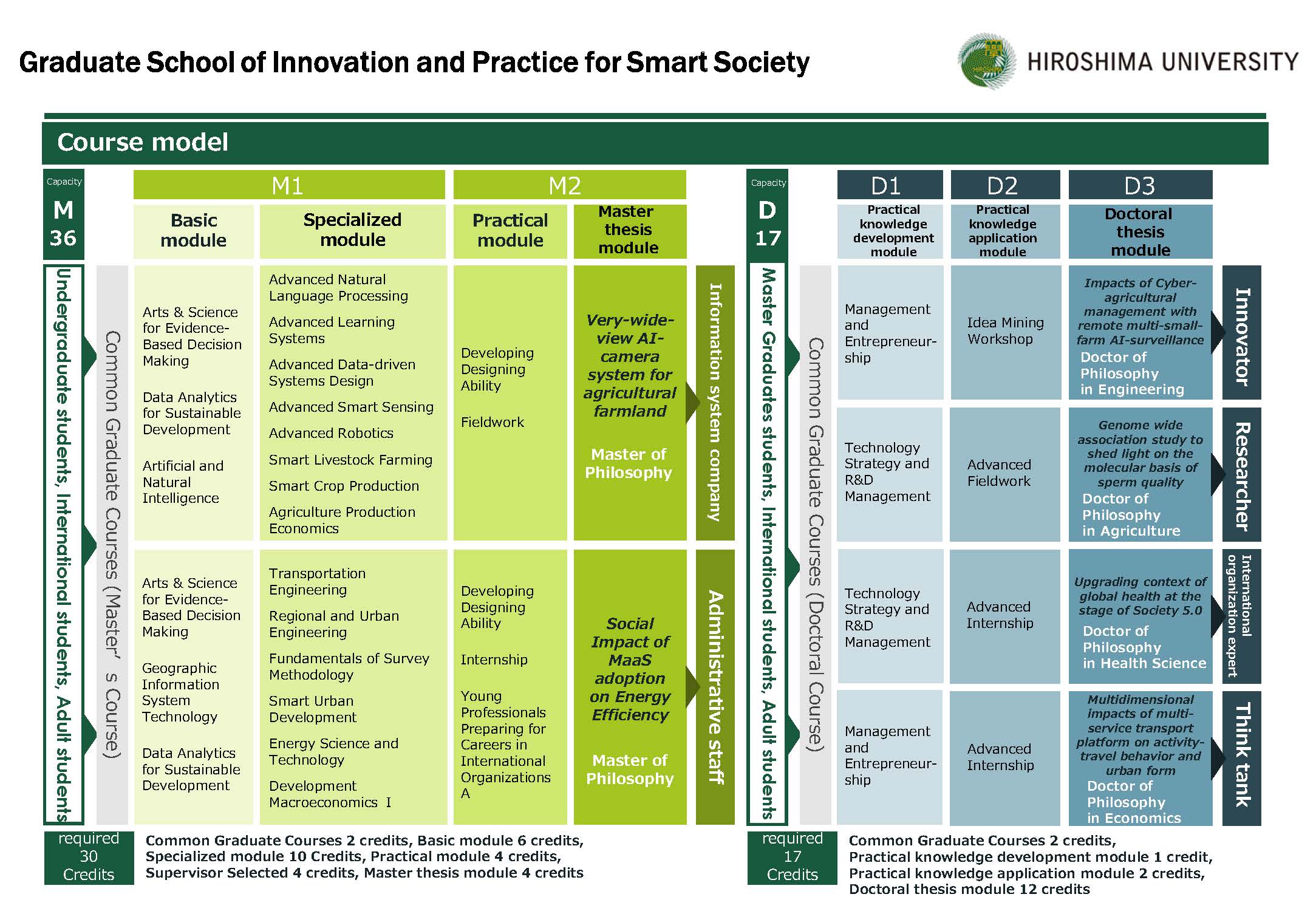Curriculum Policy
Master’s Course
To enable students to achieve the targets that are defined in the diploma policy, the Graduate School of Innovation and Practice for Smart Society organizes and executes highly interdisciplinary curriculum according to the following points.
- The School offers Basic Module that enable students to acquire "basic knowledge of information science," which is the common foundation for Society 5.0-related technologies, and "social scientific thinking and analytical skills" to grasp the essence of social issues and to connect them to the international development of Society 5.0.
- The School will provide Specialization Module to enable students to acquire expertise in research areas related to the international development of Society 5.0.
- Practical Module will enable students to acquire the necessary communication and implementation skills, with a focus on the practical experience and fieldwork necessary for implementing the international development of Society 5.0.
- The School offers Master thesis Module to provide opportunities for students to acquire research skills in practical scientific fields that integrate different areas of research, and to obtain the applied specialized knowledge and skills necessary to write academic papers that leverage those specialized skills.
- Students will also have access to Common graduate Courses, enabling them to broaden and deepen their education and cultivate the motivation to realize ‘Science for Sustainable Development’, in addition to broadening their perspectives beyond their graduate schools and specialized fields, and fostering their interest and awareness of society and social issues.
In the curriculum described above, teaching and learning will be implemented by utilizing active learning, experimental learning and online classes, in a manner that is suited to the educational content of classes, including lectures, seminars, and practical training courses.
In regards to grading, the standards are clearly outlined in the syllabus, and strict grading is conducted. Thesis defenses will be conducted in accordance with the decision criteria for awarding degrees and evaluation standards for degree theses of the School.
Doctoral Course
To enable students to achieve the targets that are defined in the diploma policy,the Graduate School of Innovation and Practice for Smart Society organizes and executes highly interdisciplinary curriculum according to the following points.
- The School will provide Practical Knowledge Development Module, to enable students to acquire the sociological knowledge necessary to facilitate the international development of Society 5.0, as well as the communication ability and presentation skills necessary to that end.
- Students will have access to Practical Knowledge Application Module, with a focus on the practical experience and fieldwork necessary for practical engagement with the development of Society 5.0, enabling them to acquire the ability to discover issues that arise in their practice and fieldwork, apply those skills in multicultural societies, and conduct technological development that can lead to solutions.
- The School offers Dissertation Module, providing opportunities for students to acquire research skills in practical science fields that integrate different areas of research, and to obtain the applied specialized knowledge and skills to draw logically clear conclusions necessary for writing academic papers that leverage those specialized skills.
- Students will also have access to Common graduate courses, enabling them to broaden and deepen their education and cultivate the motivation to realize ‘Science for Sustainable Development’ and to cultivate a broad perspective that transcends graduate schools and specialized fields, as well as an interest in society and an awareness of social issues.
In the curriculum described above, teaching and learning will be implemented by utilizing active learning, experimental learning and online classes, in a manner that is suited to the educational content of classes, including lectures, seminars, and practical training courses.
In regards to grading, the standards are clearly outlined in the syllabus, and strict grading is conducted. The dissertation defenses will be conducted in accordance with the decision criteria for awarding degrees and evaluation standards for degree theses of the School.



 Home
Home



